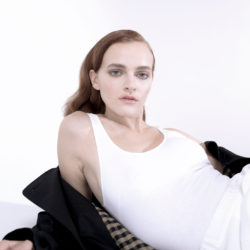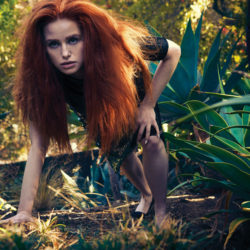Saoirse Ronan on family, trust, and the sad songs of Ireland.
INTERVIEW MICHELE MANELIS ILLUSTRATION TOM MORGAN JONES

Saoirse Ronan has been amassing Oscar nominations since she was a teenager, starting with a Best Supporting Actress nod at 13 for her astounding, yet disconcerting, performance in Atonement (2007), then progressing to Best Lead Actress nominations for Brooklyn (2016), and last year’s Lady Bird, for which she won a Golden Globe in the category of Best Actress in a Motion Picture —Musical or Comedy.
Ronan is entirely devoid of actress-y pretense. She is also unfailingly polite, and clearly does her best to live as under-the-radar as possible. It’s perhaps this reluctance to live in the spotlight that enables her to disappear so completely into roles as diverse as an Irish immigrant relocating to Brooklyn, to her upcoming turn in Mary Queen of Scots, achieving each with equal conviction.
Chatty, funny, and thoroughly likeable, Ronan, now 24, has evolved from a giggly girl, to a stylish, confident woman, very much in control of her own path.
VM: You live in Ireland but spend a lot of time in the US. When you first came to America, were you encouraged to change your beautiful, yet virtually unpronounceable name?
SR: Not many people have suggested it, but anyone who has I’ve put them down straight away. I didn’t love my name a lot when I was younger because it was so different. Nobody else had it, nobody could spell it, and nobody could pronounce it. But now I like that nobody has that name. It’s actually like a stage name in that way. It’s the same with my accent. I’m glad to have an Irish accent. I’m very proud of where I come from, I know who I am, and this is how I sound.
VM: You were born in the Bronx, New York, and your family moved to the Irish countryside when you were three. What did growing up there instill in you?
SR: Not only was I born in the Bronx, I was born on the same block as J-Lo, as you can probably tell! Well, I think growing up in the countryside makes me feel most at home in that environment, whether I’m in Ireland, Scotland, or anywhere else. The countryside has given me serenity that I always gravitate towards. Last year I was only in Ireland for a few weeks, and that definitely wasn’t enough for me. I need more time to be in the real world.
VM: Did you go through a rebellious phase?
SR: I didn’t really feel like I wanted to or I needed to, maybe because there was so much about my life growing up where I got to do what I wanted to. I think sometimes kids do that when they feel that there’s no way out, or they’re isolated, or they have to go down a particular route that’s been set out for them by people who are older. I can understand why they would rebel, but I was surrounded by a lot of very creative adults. Also, I’m just probably not the type of person that wanted to, because I’m very close to my parents. I’m really lucky that I am ridiculously close to my mom and always have been.
VM: What do your parents think of this incredible career you’ve made for yourself at such a young age?
SR: My dad is an actor, too, who started out in the theater in New York while he was a bartender. Having somebody around who had experience with different types of people on film sets was fantastic for me. He’s incredibly proud of everything that’s happened. I just feel bad for mom that she’s stuck with two actors!
VM: How do you feel about the expectations on young adults in relation to sexuality and other social pressures? And having lived all over the world, do you think there’s an obvious difference in these attitudes geographically?
SR: It’s definitely an international pressure. I think it’s something that young people, not just girls, have a lot of pressure put on them, and a lot of false perceptions of what good sex is. And I think that’s an issue everywhere equally. It’s probably because of TV, film, and the porn that’s out there. It’s important for kids to know that sex should very much be about a connection and a relationship with another person. It’s important to be with someone you trust.
VM: You’re often described as the next Meryl Streep, which isn’t too shabby.
SR: It’s lovely and amazing! She’s wonderful, and she’s made a huge difference for females in our industry. I think she and Cate Blanchett have taken on roles that transcend gender. And they’re strong and well-rounded people and that’s definitely something that I would always want to live up to.
VM: Have you ever met Meryl Streep?
SR: Yes, and it’s a funny story. Last year I was doing a play, The Crucible, in New York. We had the opening night party and all went out and had a few drinks. Then we did a matinee the next day. We were all tired and nobody felt like they were on their game. We joked around saying, “Let’s hope Meryl doesn’t come.” So we did the performance, it wasn’t our best, and as I was walking backstage, the first person I saw was Meryl Streep waiting to meet all of us. But she seemed to like us, so I think it went well.
VM: Being so close to your mom and loving Ireland so much, what was it like when you first moved to London?
SR: I remember feeling so homesick. I always needed to talk to my mom, and she really helped me through it and helped me to get the courage to keep going. When you’re on your own, you don’t have anyone to clean your clothes, cook for you, to give you a cuddle at the end of the night, so I think my appreciation of her just went through the roof. She’s my best mate.
VM: Who would you describe as your mentor?
SR: I would say Greta Gerwig (who directed her in Lady Bird). She has been a huge influence on me and I just really admire her. Also my best friend Darlene is a huge influence on me.
VM: You starred in Ed Sheeran’s video for Galway Girl. What do you remember about that experience?
SR: We were shooting as I turned 23, and all of Galway came out and just followed us around the city as we shot the video. And Ed is brilliant. He’s one of those people who’s very grounded and knows what’s important.
VM: What makes you happy in everyday life?
SR: Little things, like tea. I’d love a cup of tea right now, actually! I’ve got a big bucket of tea in my hotel room that I’m going to dive into in a while. What else? I got into Veep recently. I love watching Julia Louis-Dreyfus be a bloody genius and spin around in her little chair.
VM: And what brings you down?
SR: When I’m hungry I get very grumpy!
VM: You’re a successful young woman with a little money in your pocket. How do you spoil yourself?
SR: I don’t really go in for the shopping and all that stuff. I recently bought a nice Acne cardigan. It’s cashmere, which is quite fancy. I like going out, meeting up with friends, going to the cinema, concerts, festivals, and plays. Regular stuff.
VM: Why do you think Irish songs are often so sad?
SR: Because we went through some tough times and we’ve always managed to rise above it. We have this incredible spirit that has never died and has only gotten stronger – like lots of different cultures when faced with adversity. I think music and the arts in general tend to be the things that help you get through tough times and pull everyone together.
VM: And perhaps that’s why the Irish are known to be great consumers of alcohol?
SR: Yeah, it kept us going. We’re like, “Famine? I had no idea.”


